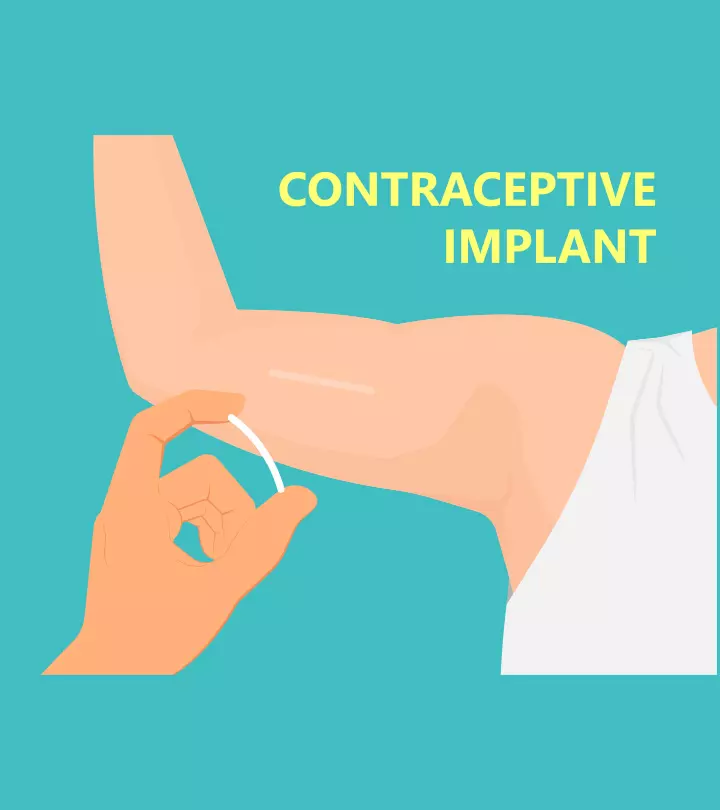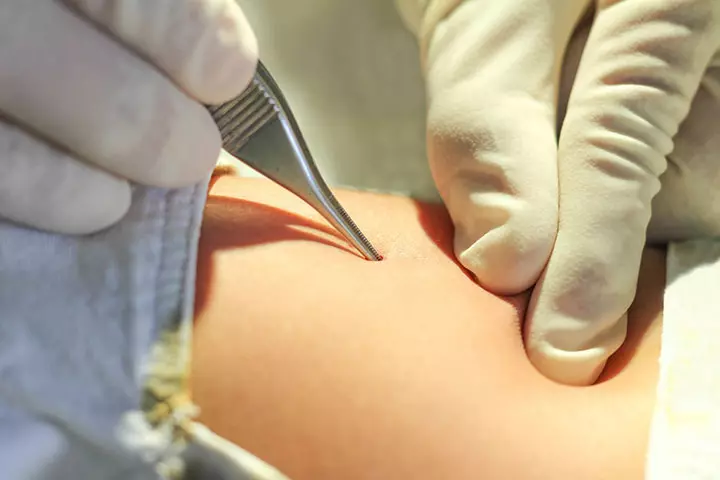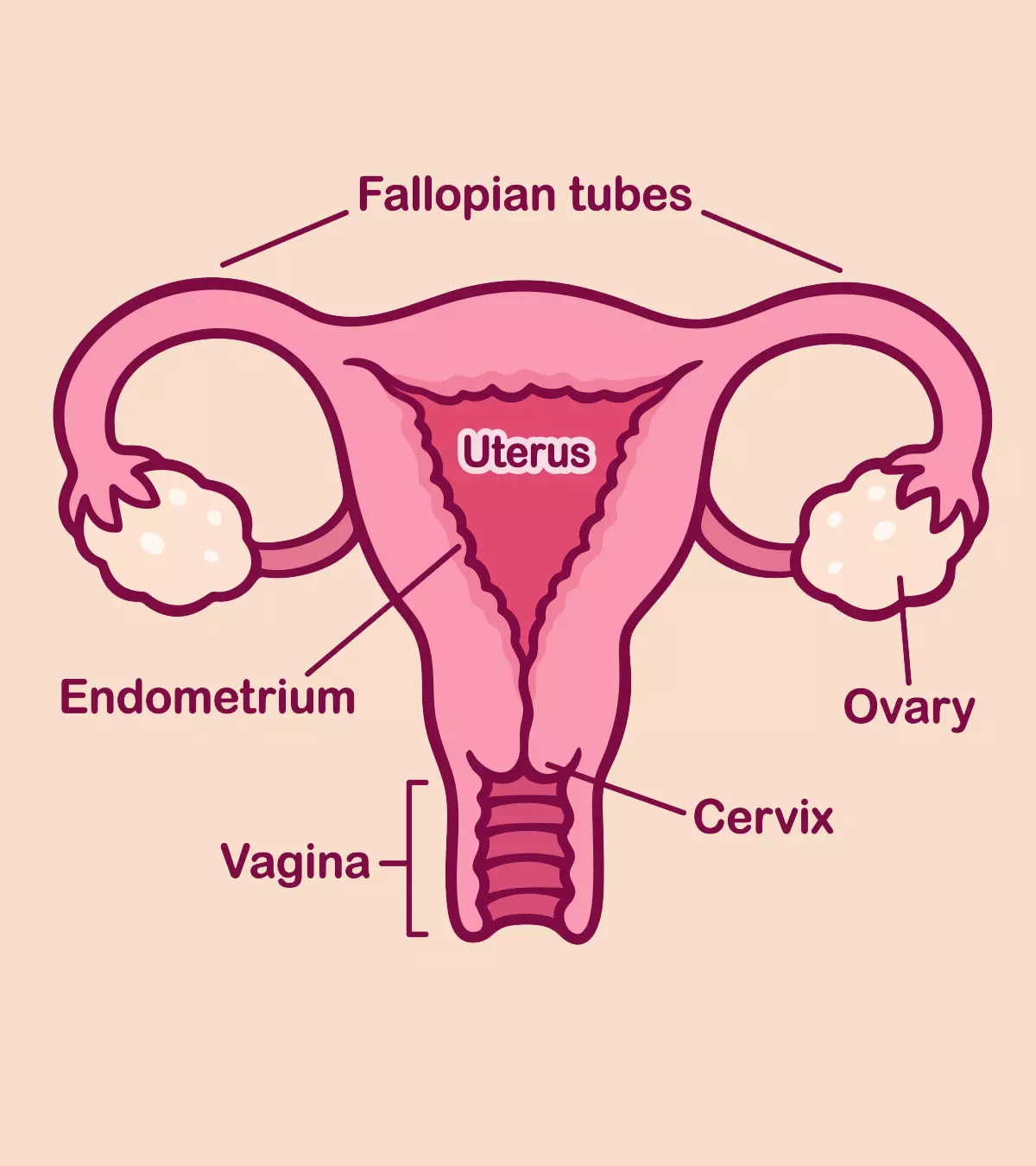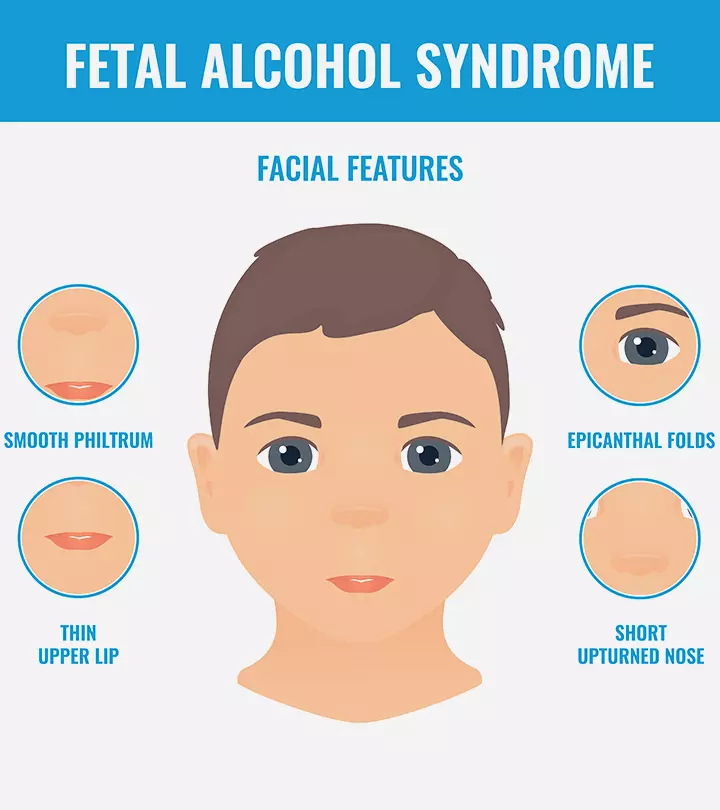
Image: ShutterStock

A birth control implant is a four-centimeter-long, soft plastic stick inserted under the skin of a woman’s upper arm. This type of implant falls under the category of long-acting reversible contraceptives (LARCs) and according to the Centers for Disease Control and Prevention (CDC), about 10.4% of women in the US opt for this type of contraceptive. Following implantation, the device slowly releases small doses of synthetic steroid progestin at regular intervals (1).
The hormone released in the body prevents pregnancy and makes birth control implant an effective hormonal contraceptive. But are birth control implants safe? Do they cause pain when inserted into the arm? (2).
Keep reading to learn if birth control implants are safe and understand their effectiveness and risks.
Key Pointers
- A birth control implant is placed under your skin and is used to prevent pregnancy.
- These implants are effective contraceptives but may not prevent STDs.
- A birth control implant will be inserted by a medical professional after considering your medical history.
- Although usually safe and convenient, a few women may experience irregular periods, nausea, acne, and hair loss after birth control implants.
How Does The Implant Work?
A birth control implant is a tiny, thin rod the size of a matchstick, used as one of the pregnancy prevention methods. It is available as the trade name of Nexplanon. It is inserted under the skin of the upper arm. It releases the hormone progestin, and it helps avoid unexpected pregnancy. The hormone responsible for birth control act in the following ways to prevent pregnancy (3).
- Progestin thickens the mucus on the cervix. It prevents the sperm from reaching the egg, preventing pregnancy.
- Progestin prevents ovulation. When there are no eggs to fertilize, pregnancy does not happen.
How Effective Is A Birth Control Implant?
The implant is one of the best contraceptive methods for family planning. It is more than 99% effective, and less than one percent of women with these implants inserted get pregnant each year.
However, this implant cannot help in preventing sexually transmitted infections (STIs). A male latex condom is the most effective way of preventing STIs, including HIV (4).
Insertion Procedure For The Implant
The doctor will ask for a detailed medical history to confirm if you are a suitable candidate to receive the birth control implant. The insertion procedure is pretty quick and does not hurt as the arm is numbed with local anesthesia before the procedure. Once the arm is numb, the doctor uses a special inserter tool to slide the implant under the skin. The procedure does not take more than a few minutes, and its effects are long-acting.
You may feel the pinch or sting when you are given the shot that numbs the skin. Once the skin is numb, you do not feel the process of the implant being inserted. Once the effect of local anesthesia wears off, you may feel a mild ache around where the implant was inserted, but the pain subsides quickly.

Image: Shutterstock
There might be localized soreness or swelling around the implant, or the surrounding skin may appear bruised for a couple of weeks after the implant is inserted. The doctor will guide you about the steps to take care of the skin around the implant.
 Quick fact
Quick factBenefits Of A Birth Control Implant
The following are the benefits of a subdermal birth control implant (5).
- They are a safe and convenient way of avoiding unintended pregnancy for up to three years.
- They are the “get-it-forget-it” mode of birth control. Because it is not user dependent, there is no risk of incorrect usage.
- They are discreet, and no one can know that you have an implant as it is not visible from the overlying skin.
- It is zero maintenance — you do not need to do anything about them until they reach their expiration date.

Image: IStock
- The implant also helps in reducing the intensity of period cramps. They also help in reducing menstrual flow. About one in three women stop getting their periods at all after a year of having an implant placed.
- Some other birth control methods use both estrogen and progesterone to help in birth control. However, some women with certain health conditions cannot use birth control methods that contain estrogen. Nexplanon is estrogen-free, and hence more women can use it.
- Nexplanon does not affect your fertility. It is reversible, and you can get it removed whenever you want to get pregnant. Moreover, it is possible to get pregnant as soon as you get your implant out of the body.
You can read about other methods of contraception here.
What Are The Drawbacks Of The Implant?
A woman’s vaginal bleeding pattern changes after the contraceptive implant has been inserted.
While some women experience frequent or irregular bleeding, about 20% of women have no menstrual bleeding at all. However, it is important to know that it is not harmful to a woman’s health. Frequent or prolonged bleeding might get better with time. The doctor might prescribe some medicines for you to help with the bleeding problems (2).
Gina Faria, a make-up artist from London, shares the drawbacks she experienced after she implanted Implanon. She says, “I had no normal periods it was just random small amounts throughout the first three months or so. This was highly irritating but manageable. I visited a doctor to see if there was anything I could take to help she simply said to wait it out until my body got used to the implant..which it did, and everything eventually returned to normal. However, sometimes I would randomly skip a month or two and not get a period at all, so it depends. It will affect different women in different ways, some women don’t even get a period at all!…lucky (i).”
 Point to consider
Point to considerWhat Are The Side Effects Of Birth Control Implants?
Some women complain of the following side effects (2) (6).
- Headache, dizziness
- Nausea
- Abdominal cramps and bloating
- Sore or tender breasts
- Mood swings
- Acne
- Hair loss
Wen Wen, a blogger, shares the side effects that she experienced after her Implanon placement, “Irregular bleeding was probably my biggest frustration when I got implanted. I would have spotting for 11 days straight or 7 days, on and off. I’ve already stocked up a drawer full of napkins and liners. Mood changes are frustrating, too, but I’ve already experienced mood changes even before. Breast tenderness or pain is bearable, but I tend to go bra-less anyway. As for the other side effects, I have not experienced headaches, dizziness, weight gain, or hair loss and no menstrual cramps, too (ii).”

Image: IStock
The following are less common side effects of birth control implants (7).
- Change in appetite
- Change in libido
The birth control implants are not shown to cause weight gain. Some of these side effects often settle with time as your body gets adjusted to the implant. If you notice these symptoms lasting longer than usual, you must bring them to your doctor’s notice, and he/she might suggest that you shift to some other mode of birth control.
Birth Control Implant Removal

Image: Shutterstock
The nurse or doctor will remove the birth control implant after three years or whenever the woman wants to stop using it. The removal is usually fast and easy. If you have had the implant for three years and still do not want to get pregnant, you can have a new implant inserted immediately after removal of your previous implant.
The process of removing the implant is a little longer than inserting it. The doctor will use an anesthetic to numb the skin around the implant. They make a small incision to retrieve the implant. Once the anesthesia begins to work, the process of putting the implant in or retrieving it doesn’t hurt. If you wish another implant to be placed, it can be done in the same appointment when you go for the implant removal (8).
Comparison With Other Birth Control Methods
When considering birth control options, it’s important to evaluate how the implant measures up against other methods. Here’s a comparison of birth control implant with other birth control methods such as pill, IUD, and condoms based on effectiveness, convenience, and potential side effects (9):
| Method | Effectiveness | Convenience | Potential Side Effects |
|---|---|---|---|
| Implant | Over 99% effective; may prevent pregnancy for up to 5 years | Requires minor procedure for insertion and removal | Irregular bleeding, headaches, mood changes |
| Pill | About 93% effective with typical use | Must be taken daily at the same time | Nausea, weight changes, mood swings, blood clots (rare) |
| IUD (hormonal) | Over 99% effective; lasts 3–12 years | Inserted by a healthcare provider; low maintenance | Irregular bleeding, cramping after insertion |
| Condoms | About 87% effective with typical use | Requires use during each sexual encounter | Possible latex allergy; no hormonal side effects |
Each method has its pros and cons, so the best choice depends on individual preferences, health needs, and lifestyle.
Frequently Asked Questions
1. When can I get my implant site wet?
The implant site can come in contact with water five days after the implantation (10).
2. Does the implant leave a scar?
There may be a small scar where the implant has been inserted (11).
3. Can I drive after getting the implant?
Yes. There may be discomfort around the implant site for a few days, but that usually will not negatively impact abilities such as driving (12).
4. Can all women use the implant?
The birth control implant is considered safe for most women. However, women with some health conditions may need to inform their doctor. These are (13):
- Acute deep vein thrombosis (blood clot)
- History of breast cancer five years ago and which has not recurred
- Unexplained vaginal bleeding, which may indicate serious underlying issues
- Liver problems such as cirrhosis or tumor
- Systemic lupus erythematosus
5. Can I still get pregnant with the implant?
For the three years of usage of the birth control implant, there is little evidence of women getting pregnant. However, its replacement is necessary after three years. If you do not get the implant replaced by the end of three years, your chances of pregnancy may increase (12).
6. Will the implant make me dry?
There is no significant evidence by researchers that suggest implants will make you feel dry. However, there may be instances where you may experience decreased libido.
7. What’s better: the implant or the pill?
Pills contain two hormones: estrogen and progesterone. Some people, such as smokers above 35, are advised against using pills containing estrogen (13). Therefore, in such a case, you may discuss with your doctor to understand which mode of contraception will suit you better.
8. Can the implant move in my arm?
The implant tends to move only a short distance in the arm. If the implant moves downwards, it may cause carpal tunnel syndrome. If the implant moves towards the shoulder, numbing effect throughout the arm will be observed. Therefore, it is advised to consult a doctor in an event like this (14).
9. Can an implant cause infertility?
There is no evidence that implants cause infertility. However, you may experience a delay in conceiving after you stop using them (12).
10. How much does a birth control implant cost?
The cost of the birth control implant, Nexplanon, is $1,092.48, including medical appointments. Furthermore, this implant is covered under the Affordable Care Act (15).
11. What happens if my implant snaps?
If the birth control implant snaps, it should be removed surgically. Until a new replacement is inserted, you will have to incorporate other control measures, such as condoms for your partner.
Birth control implants are amongst the most efficient contraception methods, preferred by most women because of their zero maintenance and easy-to-use form. The device delivers small quantities of progestin at regular intervals after implantation, thickening the mucus on the cervix and preventing ovulation. Although the implantation may impact your menstrual bleeding, it is not detrimental to your health. The procedure also has a low risk of side effects and a 99% efficacy rate in preventing unintended pregnancy for three years, making it a better option. Consult your doctor to see if you’re a good candidate for birth control implants.
Infographic: Advantages Of Birth Control Implants
There are several contraceptive methods available to avoid unwanted pregnancies. Birth control implants are one of them and are an effective method to prevent pregnancy. The infographic below presents the various advantages of birth control implants. Remember to consult your OB/GYN before opting for this method.
Some thing wrong with infographic shortcode. please verify shortcode syntax
Learn about the different birth control options available to you! Get informed and make the best decision for your body.
Personal Experience: Source
MomJunction articles include first-hand experiences to provide you with better insights through real-life narratives. Here are the sources of personal accounts referenced in this article.
i. My experience with nexplanon.
https://ginafaria.blogspot.com/2013/04/my-experience-with-nexplanon.html
ii. My experience with the birth control Implanon.
https://madramangpinay.blogspot.com/2018/03/my-experience-with-birth-control.html
References
- Steroid Hormones and Their Action in Women’s Brains: The Importance of Hormonal Balance.
https://www.ncbi.nlm.nih.gov/pmc/articles/PMC5974145/ - Contraception – implants.
https://www.betterhealth.vic.gov.au/health/healthyliving/contraception-implants - Birth Control Implant.
https://www.plannedparenthood.org/learn/birth-control/birth-control-implant-nexplanon - How effective is the birth control implant?.
https://www.plannedparenthood.org/learn/birth-control/birth-control-implant-nexplanon/how-effective-is-the-birth-control-implant - What are the benefits of using the birth control implant?.
https://www.plannedparenthood.org/learn/birth-control/birth-control-implant-nexplanon/what-are-the-benefits-of-using-the-birth-control-implant - What are the disadvantages of birth control implants?.
https://www.plannedparenthood.org/learn/birth-control/birth-control-implant-nexplanon/what-are-the-disadvantages-of-birth-control-implant - Implant.
https://www.bedsider.org/birth-control/implant - What happens when the birth control implant is removed?.
https://www.plannedparenthood.org/learn/birth-control/birth-control-implant-nexplanon/what-happens-when-the-birth-control-implant-is-removed - Birth Control.
https://www.plannedparenthood.org/learn/birth-control - Self-care after a contraceptive implant procedure.
https://www.devonsexualhealth.nhs.uk/contraception/self-care-after-a-contraceptive-implant-procedure/# - Contraceptive implant.
https://www.nhs.uk/contraception/methods-of-contraception/contraceptive-implant/ - About Implantable Contraception.
https://kidshealth.org/en/parents/about-implantable-bc.html#:~:text=Implantable%20contraception%20is%20a%20very,years%20to%20replace%20the%20tube - How safe is the birth control pill?
https://www.plannedparenthood.org/learn/birth-control/birth-control-pill/how-safe-is-the-birth-control-pill - Migration of Implantable Birth Control Devices: A Rare but Potentially Serious Problem.
https://consultqd.clevelandclinic.org/migration-of-implantable-birth-control-devices-a-rare-but-potentially-serious-problem#menu - COST OF NEXPLANON.
https://www.nexplanon.com/cost/
Community Experiences
Join the conversation and become a part of our nurturing community! Share your stories, experiences, and insights to connect with fellow parents.
Read full bio of Dr. Ng Kai Lyn
Read full bio of Dr. Ritika Shah
Read full bio of Rebecca Malachi
Read full bio of Dr. Joyani Das

















